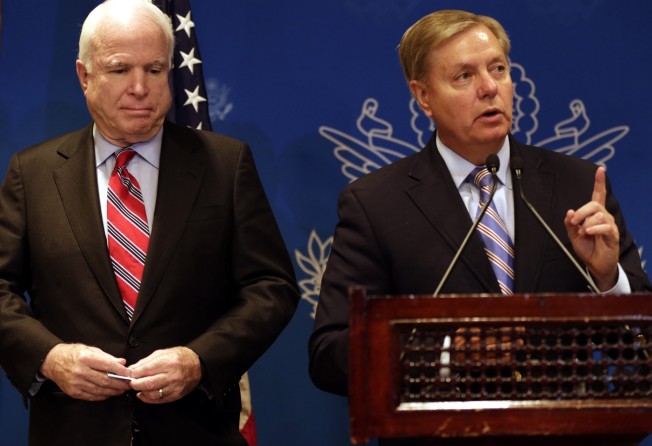Foreign envoys increase efforts to defuse Egyptian crisis

Foreign envoys stepped up efforts on Tuesday to find a way out of the crippling and sometimes deadly crisis sparked by the Egyptian army’s ouster of Islamist president Mohamed Morsi.
Leading US Senators John McCain and Lindsey Graham called on Egypt’s military-installed interim leaders to engage in an “inclusive” dialogue with Morsi supporters.
“Democracy is the only viable path to stability,” said McCain, a former presidential candidate, calling for “an inclusive political process in which all Egyptians are free to participate”.
Republicans McCain and Graham earlier met army chief Abdel Fattah al-Sisi and other interim leaders amid an intense diplomatic push to end the stalemate caused by the military’s July 3 overthrow of Morsi.
Adding his weight to the drive for a peaceful resolution to the crisis, United Nations Secretary General Ban Ki-moon urged the release of Morsi, who has been formally remanded in custody in an undisclosed location.
Ban “reiterated his call for the release” of Morsi during a call with Egypt’s Foreign Minister Nabil Fahmy, the UN said in a statement late Tuesday.
“An inclusive and peaceful political process is the only viable way forward in Egypt,” Ban stressed.
In Cairo, the senators also called for the release of members of Morsi’s Muslim Brotherhood as well as the former leader himself, who stands accused of offences committed when he escaped from prison during the 2011 revolt that toppled veteran president Hosni Mubarak.
“In a democracy, you have to talk to each other. It is impossible to talk to somebody in jail,” Graham said.
“The judicial system will deal with this in the future. Jailing opposition is not the exercise of a legitimate power,” he said.
McCain and Graham were the latest in a succession of foreign envoys to fly to Cairo in a bid to prevent any repetition of the bloodshed at a pro-Morsi rally that left at least 82 people dead on July 27.
US Deputy Secretary of State William Burns, EU foreign policy supremo Catherine Ashton, EU envoy Bernardino Leon, Arab diplomats, an African delegation and German Foreign Minister Guido Westerwelle have all travelled to Cairo seeking to defuse the crisis.
But as the diplomatic efforts intensified, tension was mounting over two protest camps maintained by Morsi loyalists, which authorities have vowed to break up.
Backers of the ousted president have staged mass demonstrations to demand his reinstatement and release while the country’s interim leadership says there can be no back-tracking on the army-drafted roadmap that provides for new elections next year.
More than 250 people have been killed since Morsi’s ouster and there are lingering fears of more violence if the protest sit-ins are dispersed forcefully.
Vice president Mohamed ElBaradei urged the Muslim Brotherhood to embrace a peaceful solution and called on Egyptian media to stop “demonising” the group.
In an interview with Al-Shorouk newspaper, ElBaradei said the Brotherhood should not gamble with the lives of pro-Morsi protesters for political gains and should “join the peaceful solutions”.
But the Brotherhood is standing its ground, with more scattered protests and marches in several parts of the capital on Tuesday.
“Only a political solution to restore continuity of constitutional legitimacy will end crisis,” tweeted the group’s spokesman Gehad al-Haddad.
A senior administration official said that interim leaders were working on two tracks to end the crisis.
The first is finding a political solution in which the protesters would “understand the reality and recognise that there has been change. In exchange, they get to participate in political life,” the official said.
“As part of the package, they would ask their people to end their sit-ins,” the official said.
The second option would be to disperse the protests “with as few losses as possible”, the official said.
Authorities have promised demonstrators a safe exit and said an end to their protests would allow the Brotherhood’s return to political life.
Interim foreign minister Fahmy insists the authorities have “no desire to use force if there is any other avenue that has not been exhausted”.
And army chief Sisi underlined his “wish for a peaceful resolution of the demonstrations” in a call with US Defence Secretary Chuck Hagel, according to a Pentagon statement.
Meanwhile, despite calls for the release of Brotherhood members, prosecutors on Tuesday ordered the detention of two Morsi aides for 15 days.
The deposed president’s secretary Ahmed Abdel-Aati and his security advisor Ayman Hodhod are being investigated over deadly clashes outside the Ittihadiya presidential palace last December when Morsi was in power.
And the political impasse has slowed plans for a return to elected government, one senior government official said on Monday.
“We have been so focused on [the protest camp at] Al-Rabaa al-Adawiya that we can’t even concentrate on preparing the electoral process,” said the official.